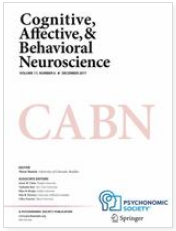阿部准教授、柳澤助教らの論文が『Cognitive, Affective, and Behavioral Neuroscience』に掲載されました
上田竜平・オフィスアシスタント(文学研究科大学院生・日本学術振興会特別研究員)、柳澤邦昭助教、阿部修士准教授らの執筆した論文が、学術誌『Cognitive, Affective, and Behavioral Neuroscience』Vol.17 に掲載されました。
本研究は「浮気」に対する興味関心の制御に関わる認知基盤に焦点を当てた研究です。機能的磁気共鳴画像法 (fMRI)を用いた実験から、特定のパートナーと交際している恋愛中の男性が、魅力的な女性に対する興味関心を制御するには、1) 浮気を是としない潜在的な態度と、2) 前頭前野による行動制御の機構、の両者が必要であることが示されました。
なお、本研究はこころの未来研究センター連携MRI研究施設のMRI装置を用いて行われました。
 Ueda R, Yanagisawa K, Ashida H, Abe N (2017) Implicit attitudes and executive control interact to regulate interest in extra-pair relationships. Cognitive, Affective, and Behavioral Neuroscience 17 (6): 1210-1220
Ueda R, Yanagisawa K, Ashida H, Abe N (2017) Implicit attitudes and executive control interact to regulate interest in extra-pair relationships. Cognitive, Affective, and Behavioral Neuroscience 17 (6): 1210-1220https://link.springer.com/article/10.3758/s13415-017-0543-7
○Abstract
Do we actively maintain monogamous relationships by force of will, or does monogamy flow automatically? During functional magnetic resonance imaging (fMRI), male participants in a romantic relationship performed the Implicit Association Test (IAT) to evaluate implicit attitudes toward adultery and a go/no-go task to measure prefrontal activity implicated in explicit executive control. Subsequently, they were engaged in a date-rating task in which they rated how much they wanted to date unfamiliar females. We found that the individuals with higher prefrontal activity during go/no-go task could regulate the interest for dates with unattractive females; moreover, the individuals with both a stronger negative attitude toward adultery and higher prefrontal activity could regulate their interest for dates with attractive females, and such individuals tended to maintain longer romantic relationships with a particular partner. These results indicate that regulation of amorous temptation via monogamous relationship is affected by the combination of automatic and reflective processes.
Keywords : Monogamy fMRI Dual-process theory Implicit social cognition Self-control
2017/12/06